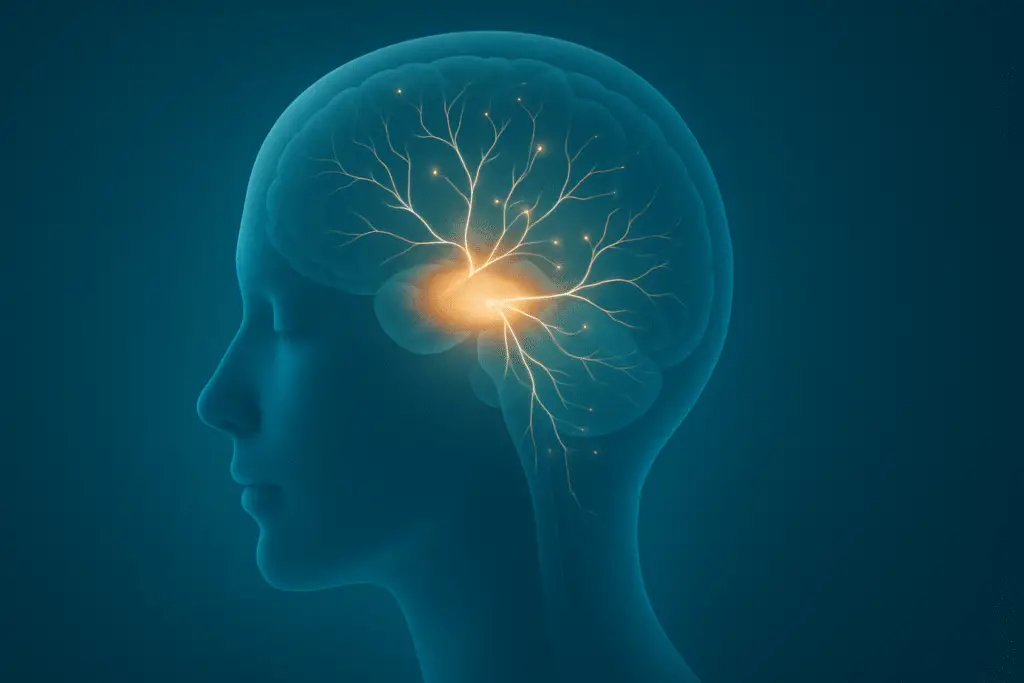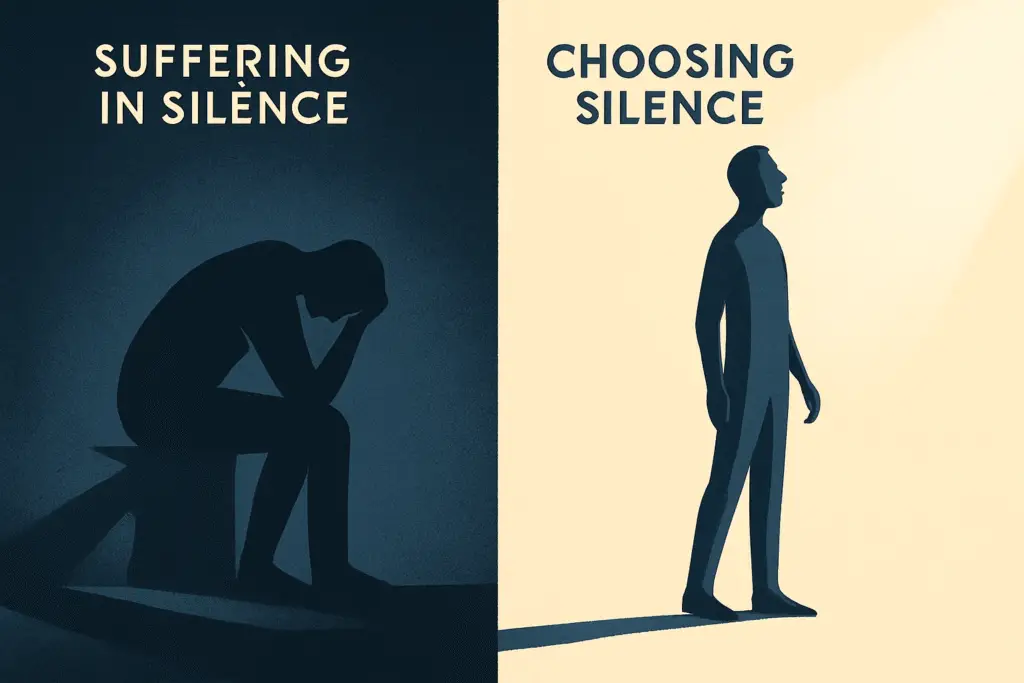The Unseen Burden of Modern Noise
In our hyper-connected world, constant noise—digital pings, urban hum—subtly impacts mental well-being. This pervasive cacophony has elevated silence from mere absence to a crucial mental health element. As stress, anxiety, and digital burnout rise, intentional quiet offers vital respite. Growing interest in silence, evident in search trends, underscores a collective yearning for peace. This article explores the scientific and psychological benefits of silence, demonstrating how intentional quietude can be a powerful tool for mental clarity, emotional regulation, and overall well-being, offering practical applications for a quieter mind in a noisy world.
The Mental and Physical Science of Silence: A Deep Dive

Silence profoundly affects our brains and bodies, from cellular regeneration to stress hormone levels.
Neurological Regeneration: The Brain in Quietude
Silence actively promotes neurological regeneration. Research, including studies highlighted by Harvard Medical School, suggests quiet periods can foster new brain cell development, particularly in the hippocampus—a region vital for memory, learning, and emotional regulation. A 2013 study in Brain, Structure and Function found two hours of daily silence led to new hippocampal cell growth in adult mice This hints at silence’s restorative power on brain plasticity and cognitive function, suggesting the brain uses quiet to maintain and grow, leading to mental refreshment.

Stress Reduction and Physiological Impact: Beyond the Absence of Sound
Silence significantly reduces stress. It’s not just quiet; it’s an active state that lowers stress hormones and promotes relaxation. A notable 2006 Heart journal study found two minutes of silence more relaxing than music, based on blood pressure and brain activity. Constant noise keeps our bodies in a heightened state, triggering fight-or-flight and increasing cortisol. Silence, conversely, shifts the autonomic nervous system to a parasympathetic state, promoting rest and repair. These physiological changes show silence offers restorative effects similar to meditation, simply by allowing the body and mind to decompress.
The Emotional and Psychological Impact: Cultivating Inner Peace

Silence profoundly influences our emotional and psychological landscapes, fostering clarity and resilience.
Enhancing Mental Clarity and Emotional Regulation
Without external distractions, silence allows introspection and self-reflection. This quiet space helps process thoughts and emotions uninterrupted, enhancing mental clarity. Constant information bombardment strains cognitive resources; silence, however, fosters focused attention and improved problem-solving. It also aids emotional regulation, allowing individuals to better understand their emotional states, leading to more effective coping and greater control. This increased self-awareness builds emotional resilience.
Alleviating Overload: Anxiety, Mild Depression, and Sensory Burnout
Modern life’s relentless information and sensory input often lead to “overstimulation,” manifesting as anxiety, mild depression, and “digital burnout.” Silence is a powerful antidote. By reducing external sensory demands, it allows the brain to rest and recalibrate. For anxiety, quiet moments calm the nervous system, reducing racing thoughts. For mild depression, silence offers introspection without external pressure, fostering peace. It provides much-needed respite from digital demands, aiding mental recovery.
Real-Life Practices and Rituals: Integrating Silence into Daily Life

Integrating silence doesn’t require drastic changes; even small, intentional moments yield significant benefits.
Intentional Quiet: From Mornings to Walks
“Silent mornings,” avoiding digital devices for the first hour, can set a calm tone. “Tech-free rituals” throughout the day provide mental breaks. “Silent walks” in nature or quiet parks offer moving meditation, shifting focus from external distractions to internal sensations. These practices reset the mind, reduce clutter, and improve well-being by fostering self-connection.
Deeper Immersion: Silent Dinners and Retreats
For deeper quiet, “silent dinners” offer mindful eating and connection without conversation. More immersive are “silent retreats,” like Vipassana, involving extended silence. Participants report profound psychological and spiritual benefits, including reduced stress and increased clarity. These experiences demonstrate prolonged silence’s transformative power.
Micro-Moments of Silence: Accessibility in a Busy World
“Micro-silences” offer an accessible alternative: brief, intentional pauses throughout the day—a few minutes of contemplation, stepping away from noise, or focusing on breath. These small moments accumulate, providing cumulative benefits. Silence is accessible to all, regardless of schedule. Consciously embracing these brief pockets of quiet helps manage stress, improve focus, and cultivate calm amidst busy lives.
Cultural and Social Dimensions: Reclaiming Silence

Silence holds significant cultural and social implications, reflecting societal values and coping mechanisms.
The Stigma vs. The Power: “Suffering in Silence” vs. “Choosing Silence”
“Suffering in silence” often links to mental health stigma. This contrasts with the empowering act of “choosing silence” for well-being. In a society equating constant activity with productivity, opting for quiet is a radical act of self-care. Noise can be emotional distraction. Embracing silence reclaims agency over internal landscapes, shifting from passive suffering to active self-nurturing, challenging norms that discourage introspection.
Silence as Healthy Resistance: Countering Hyper-Productivity
In a hyper-productive, constantly connected culture, silence is powerful resistance. The pressure to be always ‘on’ leads to burnout. Choosing silence, even briefly, defies this demand. It allows disengagement from external pressures and reconnection with inner selves, fostering deeper self-connection and genuine rest. This deliberate act of stepping back from constant doing reclaims personal time and mental space, countering societal pressures prioritizing external validation.
Conclusion: Silence as Presence, Self-Care, and Emotional Longevity

Far from empty, silence is a profound presence—a fertile ground for introspection, creativity, and healing. It’s an active state nurturing mental and physical health. In our noisy world, intentional quiet emerges as accessible, powerful self-care. From neurological regeneration and stress reduction to mental clarity and emotional resilience, silence’s science-backed benefits are undeniable. Embracing silence contributes to emotional longevity, allowing us to process, reflect, and rejuvenate. Integrating micro-moments or seeking immersive experiences transforms our relationship with noise, cultivating a more peaceful existence. The message is clear: in a world demanding constant attention, choosing silence is choosing ourselves.



